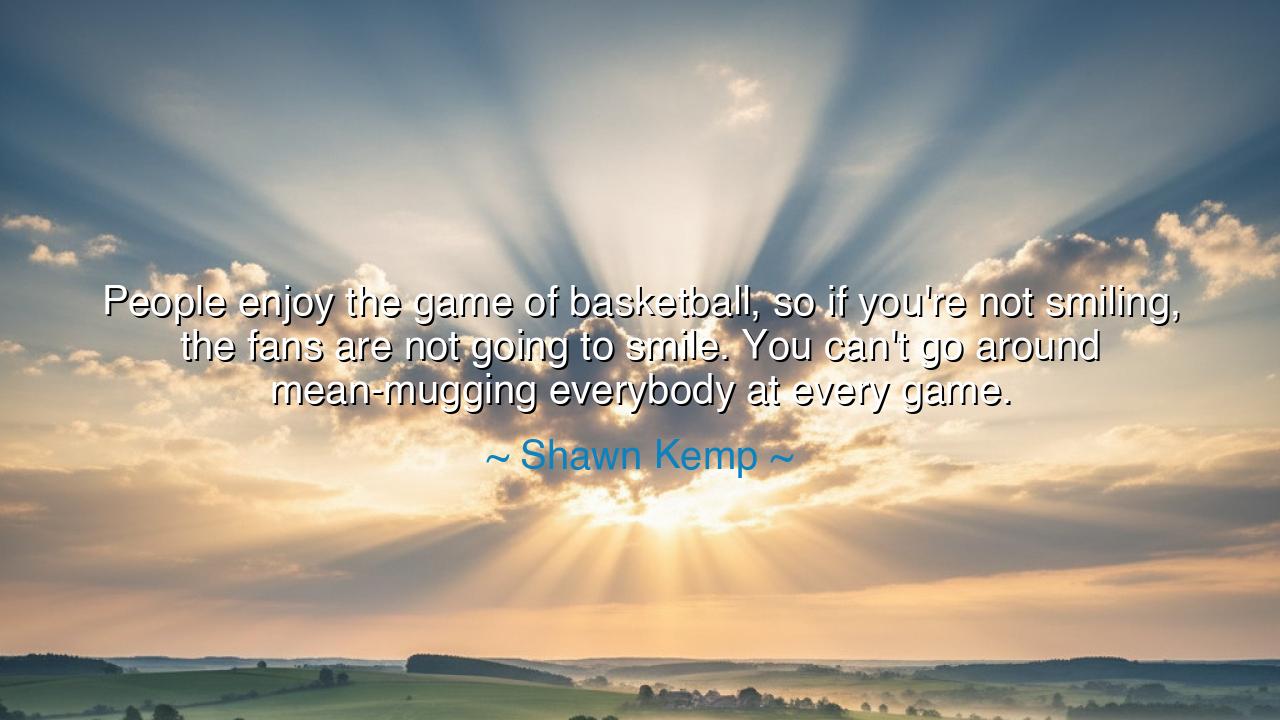
People enjoy the game of basketball, so if you're not smiling
People enjoy the game of basketball, so if you're not smiling, the fans are not going to smile. You can't go around mean-mugging everybody at every game.






Hearken, O seeker of wisdom, and attend to the words of Shawn Kemp: “People enjoy the game of basketball, so if you're not smiling, the fans are not going to smile. You can't go around mean-mugging everybody at every game.” Within this utterance lies an ancient truth, that joy and energy are contagious, and that the spirit of a leader or participant shapes the experience of all who bear witness. To carry anger or sternness without reason is to cast shadows over a realm meant for delight and communal celebration.
Long before the courts of modern sport, philosophers and teachers spoke of the subtle influence of demeanor upon the hearts of others. The Greeks taught that leadership is reflected not only in action but in presence, that the aura of the few shapes the experience of the many. Kemp’s wisdom echoes this timeless understanding: when the bearer of energy smiles, enthusiasm spreads, and when the bearer is harsh or withdrawn, gloom follows. The face of one can color the mood of all.
Consider the life of Nelson Mandela, who understood the power of presence and warmth in times of tension. Though burdened by decades of imprisonment and the weight of his nation’s expectation, Mandela frequently greeted others with a calm smile, radiating hope and reassurance. This simple gesture transformed interactions, inspired courage, and drew allies to his cause. Like Kemp, he recognized that the demeanor of a leader—or any participant—carries profound consequences for those around them.
There is a subtle heroism in choosing joy amid responsibility. To smile when all eyes are upon you, to radiate light and encouragement, is to practice self-mastery and empathy. The ancients would counsel that a leader, whether on the battlefield, in the agora, or on the playing field, bears the spirit of those who follow. A frown, a harsh glare, or a countenance closed to joy becomes a barrier, while a smile becomes a bridge, inviting connection and shared delight.
Even in the realm of competition, the story of Bill Russell illustrates this truth. Russell, though fiercely competitive, often infused his teammates and fans with positive energy, a quiet smile or encouraging word in moments of tension. His demeanor did not diminish the intensity of the game but amplified the cohesion and morale of all who watched and played. Kemp’s observation is thus timeless: joy is infectious, and its absence is equally potent.
From this, we discern practical wisdom: cultivate a countenance of warmth and openness, especially when others look to you for inspiration or leadership. In the arenas of life—whether sports, work, or community—the energy you project shapes the experience of all present. A deliberate smile, a nod of encouragement, or a gentle gesture can transform tension into camaraderie, stress into joy, and observation into engagement.
Moreover, Kemp’s words teach a deeper lesson: the smallest gestures carry weight. A smile is not mere decoration; it is a conduit of influence, an acknowledgment of shared humanity. The ancients understood this principle in every act of leadership: the heart of one, expressed through the face and actions, can lift or burden the hearts of many. To smile in service of others is both a gift and a responsibility, a practice that strengthens the bonds of community.
Thus, let each heart carry this truth forward: joy is a seed, and your countenance its sunlight. By choosing to smile, to radiate warmth, to temper intensity with lightheartedness, you honor the experience of others and amplify the vitality of every encounter. Kemp’s insight reminds us that leadership, engagement, and influence are not merely enacted through feats or words alone, but through the simple, profound, and ancient power of a smile.
If you wish, I can also craft a concise, audio-friendly version of this reflection, rhythmically structured to be engaging and emotive for narration. Do you want me to create that version?






AAdministratorAdministrator
Welcome, honored guests. Please leave a comment, we will respond soon